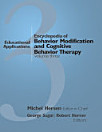Issues in Diagnostic Research
Michel Hersen · Cynthia G. Last
dec. de 2012 · Springer Science & Business Media
Libro electrónico
360
Páxinas
reportAs valoracións e as recensións non están verificadas Máis información
Acerca deste libro electrónico
Prior and subsequentto the publication of the third edition of the Diagnos tic and Statistical Manual of Mental Disorders (DSM-III), we have witnessed a considerable upsurge in the quantity and quality of research concerned with the psychiatric diagnostic process. There are several factors that have contributed to this empirical influx, including improved diagnostic cri teria for many psychiatric disorders, increased nosological attention to childhood psychopathology, and development and standardization of several structured diagnostic interview schedules for both adult and child populations. With the advent of DSM-III-R, and in anticipation of DSM-IV, diagnostic labels and their definitions have been in a state of change, as evinced by the many refinements and modifications currently taking place. However, the basic purpose or raison d'etre of the nosological scheme has not been altered. Psychiatric diagnosis is the means by which we classify or categorize human psychopathology. And, as is the case in the medical arena, psychiatric diagnosis serves three central functions: classification. communication. and prediction. As research accumulates, our understanding of psychiatric disorders increases, and we are in a much better position to classify reliably and with validity, as well as to com municate and predict Despite periodic changes in the diagnostic system, the basic strategies for conducting diagnostic research (e. g. , genetic-family studies, biological markers, follow-up studies, etc. ) do not vary appreciably over time. But in over one decade no scholarly book has appeared that tackles the essential research issues involved in upgrading the diagnostic endeavor.
Valora este libro electrónico
Dános a túa opinión.
Información de lectura
Smartphones e tabletas
Instala a aplicación Google Play Libros para Android e iPad/iPhone. Sincronízase automaticamente coa túa conta e permíteche ler contido en liña ou sen conexión desde calquera lugar.
Portátiles e ordenadores de escritorio
Podes escoitar os audiolibros comprados en Google Play a través do navegador web do ordenador.
Lectores de libros electrónicos e outros dispositivos
Para ler contido en dispositivos de tinta electrónica, como os lectores de libros electrónicos Kobo, é necesario descargar un ficheiro e transferilo ao dispositivo. Sigue as instrucións detalladas do Centro de Axuda para transferir ficheiros a lectores electrónicos admitidos.





